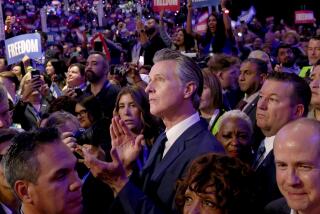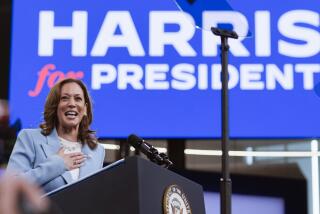Ron Paul’s followers fight until the very end
TAMPA, Fla. — Ron Paul’s fiercely loyal supporters fought until the bitter end on Tuesday, challenging rule changes that weakened their delegate count at the Republican National Convention and made it harder for future candidates to re-create what the Texas congressman did in his third presidential bid.
That bid ended Tuesday, when Mitt Romney was nominated by the GOP to take on President Obama. Coming into the convention, Paul didn’t have anywhere near the number of delegates necessary to challenge Romney’s nomination. But he was the sole GOP primary candidate not to bow out of the race, endorse Romney and release his delegates.
And when he did two swings through the Tampa Bay Times Forum on the opening day of the convention, shaking hands and greeting supporters, Paul seemed as though he were still running for office. Several state delegations tried to put his name into consideration, but were stymied by delegate-seating decisions by the RNC.
Paul’s supporters reacted angrily. Several members of the Maine delegation walked out of the arena after the convention affirmed the GOP’s decision to replace 10 of the state’s 24 delegates.
“It’s a disgusting, disgusting display of a hostile takeover from the top down,” said Ashley Ryan, 21, a Maine delegate. “It’s an embarrassment.”
Paul did not win a single state; however, his ardent followers worked arcane local and state party rules to take over several state delegations, including garnering 20 of Maine’s 24 spots. The RNC decided to replace 10 of them, effectively stopping the state from being able to submit Paul’s name for nomination. (In response, the state’s Republican governor, a Romney supporter, decided to boycott the convention.)
That seating decision along with others prompted Wiselet Rouzard, a delegate from Nevada and a Paul supporter, to compare the situation to Adolf Hitler taking power in Germany.
“There’s nothing American about what just happened,” he said. “This is the death of the Republican Party.”
Once Romney was nominated, during the roll call of states, several listed votes for both Romney and Paul. When repeating back the count, officials at the podium cited only the Romney votes. In the end, Romney received more than 2,000 votes, easily securing the nomination, while Paul received just under 200.
For Paul, this is effectively the end of his political career. After serving in Congress for more than two decades, the 77-year-old is retiring when his term ends in January. Over the weekend, his supporters held a sparsely attended three-day Paul Festival, and Paul headlined a raucous rally that attracted several thousand supporters.
While he may be finished, he pledged that his movement — focused on strict interpretation of the Constitution, downsizing the government and an isolationist foreign policy — was not.
“Don’t they only wish!” Paul said of the GOP establishment. He told thousands on Sunday that the pursuit of basic liberty was stronger than ever.
“It’s coming about, not only because I believe we’re right on the issues, but what is coming out right now is proof positive that their philosophy of government — foreign policy, monetary policy or economic policy — is failing and they need to do something different,” Paul said.
The crowd responded by chanting, “President Paul! President Paul! President Paul!”
Paul is not speaking at the convention, telling the New York Times that he would have been allowed to do so only if he endorsed Romney and allowed his campaign to vet his script, which he refused to do. But he will stick around for Wednesday night, when the RNC pays tribute to him with a video and for a speech by his son, Kentucky Sen. Rand Paul, who some believe is the heir to Paul’s movement.
Times staff writer Mitchell Landsberg contributed to this report.
More to Read
Sign up for Essential California
The most important California stories and recommendations in your inbox every morning.
You may occasionally receive promotional content from the Los Angeles Times.











